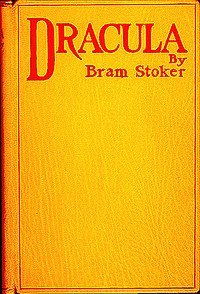Modern Zorker's Guide to Getting Started Reading Horror, Part I: Classic Horror

Source: Wikipedia.org
Leave it to @darth-azrael to write a comment that gets me thinking about a whole new blog post. In my post about horror books I picked up recently, the Sith-y one stated that, having started with King, finding good horror novels is like finding good fantasy novels after you've started with Tolkien.
I can so sympathize.
If we can get all biological up in here for a minute (a phrase that never fails to make @effofex start breathing heavily), let's remember our taxonomic nomenclature of classifications. Using the mnemonic "Dope King Phil Came Over For Gratuitous Sex", it's easy to recall Domain, Kingdom, Phylum, Class, Order, Family, Genus, and Species.
'Horror' isn't a Domain or a Kingdom, but rather more an Order or Family from which extend dozens of different branches and options. So just as the mystery genre can be broken down into sub-categories like "locked room", "whodunnit", and "stories involving cats", so too can horror be broken down into sub-categories like "killer clowns", "splatterpunk", and "William W. Johnstone".
What's a new reader to do?
That's where I come in. Let's talk shop.
Let's talk about Horror.
Part 1: The Classics
We've always had "horror". Campfire tales, mythology, folklore, and fairy tales are rank with terrible things happening to innocent people, and we've been telling them to one another since humans began communicating beyond the ape-like vocalizations @blewitt insists on using when he wants me to loosen the ball gag or unchain him from the sawhorse. Even stories like "Sleeping Beauty" and "Cinderella" take on horrifying aspects when you strip away the Disney-fied veneer and look at the source materials.
Classic literature itself is rife with horrific themes. Mary Shelley's Frankenstein, Bram Stoker's Dracula, and Robert Louis Stevenson's The Strange Case of Dr. Jekyll and Mr. Hyde are but three popular novels that helped produce the heaping body of film, television, and, and stories we have today. Then there are the aforementioned fairy tales and folk tales from cultures all across the world, everything from Washington Irving's American The Legend of Sleepy Hollow to M. R. James's British Ghost Stories of an Antiquary to Lafcadio Hearn's considerable undertaking to translate the world of Japanese legends for English-speaking audiences.
The best thing about classic horror is how easily available it is. No bookstore worth its shelves would be caught bereft of Poe or Lovecraft, but what's even better is that much that is considered "classic" horror has long since expired its copyright, meaning anyone who wants to can do with it pretty much whatever they like, including giving it away for free. The Project Gutenberg website hosts over 50,000 free e-books, all available in a variety of formats for your home computer, tablet, phone, or e-reader, so if you're not sure where you want to start, at least you don't have to spend any money to get (re)acquainted with classics like...
- Frankenstein by Mary Shelley
- Dracula by Bram Stoker
- The Monkey's Paw by W. W. Jacobs
- The Works of Edgar Allan Poe: Volume 1, Volume 2, Volume 3, Volume 4, Volume 5.
- Carmilla by J. Sheridan LeFanu
- The Legend of Sleepy Hollow by Washington Irving
- The House on the Borderlands by William Hope Hodgeson
- Ghost Stories of an Antiquary by M. R. James
- Kwaidan: Stories and Studies of Strange Things by Lafcadio Hearn
- Day and Night Stories by Algernon Blackwood
- The Complete Works of H. P. Lovecraft by H. P. Lovecraft
- The Monk: A Romance by Matthew Gordon Lewis (yes, despite the subtitle, this is most definitely a work of horror)
- The Castle of Otranto by Horace Walpole (widely considered the progenitor of the Gothic genre after its publication in 1765).
Keep in mind, this is just a small sampling of all that "Classic" horror has to offer. Some of them are more famous than others, some of them have aged well, some have aged poorly, but there can be no denying their influence on later authors.
If you're interested in understanding the history of the genre, or reading the works of people who inspired Stephen King, Dean Koontz, and other modern-day writers, this is the place to start.
Can't beat the price either. :)
This is fabulous. Definitely some things on this list I'm adding to my queue.
Hope you enjoy them, @methus! What caught your fancy? :)
I've not read the following:
Of these, I'm most intrigued by The Monk.
I don't think you'll be disappointed. The Monk is spectacularly vile, especially for its day and age. Otranto is much slower, but it's fascinating to see how it and Northanger Abbey by Jane Austin pretty much laid the foundation for what became the Gothic novels of the 20th century. :)
I want you to switch to this kind. Stop being cheap. #upgrademygag
Nice try, buddy, but the last time four centimeters was enough to keep you quiet was fifth grade. ;)
I didn’t make it to 5th grade so....
My word, this reminds me, I really, really need to do part 2 of my 'Journey into Lovecraft' read-through of all his short fiction.
Yes, you most certainly do, @terry93d. :)